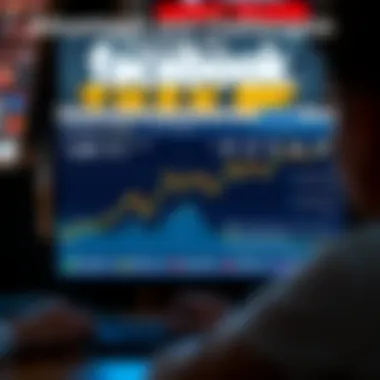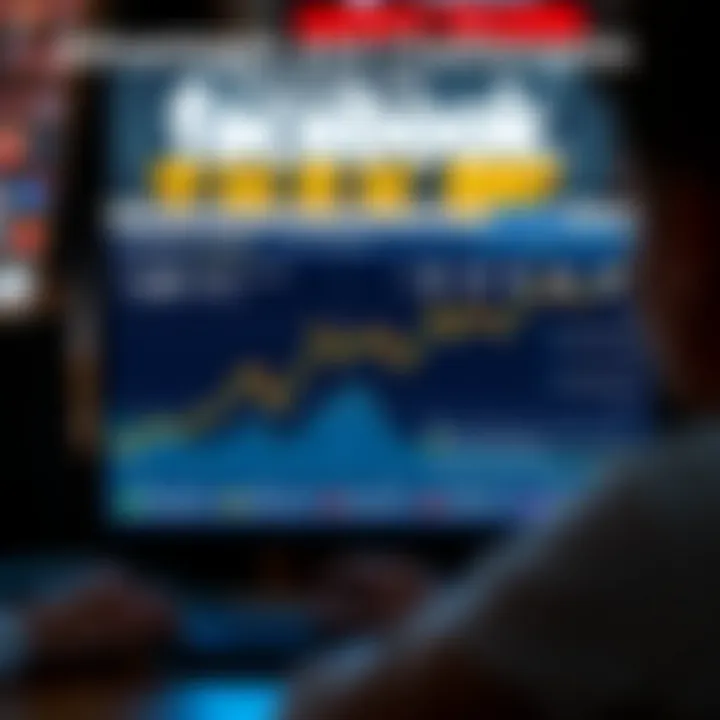Exploring the Impact of Facebook Traders on Crypto Markets


Intro
In a world where the digital age is reshaping every facet of our lives, it’s no surprise that the way we trade cryptocurrencies is also evolving. Facebook traders have surged into the cryptocurrency market, helped by the vast reach of social media and the communal aspect that platforms like Facebook provide. This article will navigate the intricate pathways of this phenomenon, shedding light on the strategies employed by traders in these online forums, their motivations, and how their participation influences market dynamics.
Such traders often congregate in specialized groups, sharing insights, tips, and real-time market analysis. The information flow is rapid, and decisions can be based on a mix of data, gut feelings, and the prevailing sentiment of the community. Thus, understanding how these dynamics function is valuable not just for those trading on Facebook but for anyone interested in the broader cryptocurrency landscape.
Understanding Cryptocurrency Fundamentals
Before diving deeper into the social dynamics at play, it’s essential to grasp the basics of cryptocurrencies and the technology underlying them.
What is Cryptocurrency?
Cryptocurrency exists in a peer-to-peer network, enabling users to send and receive money without needing intermediaries such as banks. Basically, it’s a digital currency based on cryptography, making it secure and hard to counterfeit. Think of it as a new form of money that is not tied to any physical asset or government and operates on a decentralized basis.
How Blockchain Technology Works
At the heart of cryptocurrencies lies blockchain technology. This innovative structure allows for the recording of transactions across many computers so that the recorded transactions cannot be altered retroactively. Each block in the chain is like a digital ledger entry, which contains several transaction records, and is connected to the preceding block, forming a chain. This significantly enhances security and transparency.
"Blockchain is the backbone that supports cryptocurrencies. Understanding it is central to grasping how digital currencies operate."
Market Insights and Trends
With a fundamental knowledge in place, we can now look at market trends that are shaped by the engagement of Facebook traders.
Current Market Trends and Analysis
In recent years, the trading of cryptocurrencies has experienced significant flux, with platforms like Facebook contributing to this dynamism. Traders utilize market sentiment analysis often discussed in Facebook groups to make informed decisions. Additionally, trends such as the growing acceptance of cryptocurrencies by mainstream businesses add to their impact on the market.
- Growing influence of social media in decision-making
- Heightened volatility due to speculative trading
- Increased adoption among institutional investors
Such trends underline a market that fluctuates not just based on traditional economic indicators but also shaped by the collective emotional and psychological aspects highlighted by Facebook interactions.
Future Predictions and Investment Strategies
Looking ahead, one might predict an increase in regulatory scrutiny as governments grapple with the rise of cryptocurrency. However, the community-driven nature of trading on Facebook makes it likely that traders will continue to adapt and refine their strategies. They may carry out analytical studies of groups and use access to various trading tools to navigate the complexities of this evolving space.
Intro to Facebook Trading
The rise of social media has undoubtedly redefined how people interact, communicate, and even invest. Within this digital landscape, Facebook stands out as a pivotal arena where traders converge, share information, and utilize collective knowledge to navigate the often turbulent waters of the cryptocurrency market. Understanding Facebook trading is not just an academic exercise; it is essential for anyone interested in grasping the current dynamics of cryptocurrency investing.
Definition of Facebook Trader
A Facebook trader is someone who engages in buying and selling cryptocurrencies, leveraging groups, forums, and personal connections within the Facebook platform. Unlike traditional traders, whose discussions opine on economics and financial data, Facebook traders heavily rely on social networks for real-time updates and sentiment analysis. Their trades are influenced less by abstract charts and numbers and more by the sentiments of those they trust or connect with. These are individuals who might share tips, call out outlandish price projections, or even celebrate their successes, often fostering a sense of community and collective interest.
Historical Context of Social Media in Trading
The historical backdrop of social media in trading dates back to the early 2000s, but only gained substantial traction with the advent of platforms like Facebook. Early adopters utilized these networks primarily for gathering insights and networking, paving the way for a more collaborative approach to trading. This evolution coincided with the introduction of cryptocurrencies; as Bitcoin and altcoins emerged, so did the necessity for information-sharing channels.
In these formative years, traders found comfort in groups where they could discuss digital currencies without the intimidating lingo often associated with stock trading. The democratization of information was a game changer, allowing novices and seasoned traders alike to pool knowledge and strategies. Over time, Facebook transformed into a hub for not only investment tips but also support and camaraderie.
"The emergence of social media has shifted the trading paradigm from isolated decision-making to collaborative engagement."
As a consequence, Facebook trading has grown to reflect broader trends in market behavior, as traders who once operated independently now utilize these platforms to discuss potential trades, market moves, or innovations in the cryptocurrency realm. Each interaction often becomes part of the larger tapestry of sentiment that influences buying and selling decisions. Understanding this context is paramount in dissecting the motivations and strategies of Facebook traders today.
The Rise of Social Media in Cryptocurrency Trading
The integration of social media platforms and cryptocurrency trading has become a pivotal aspect of modern finance. As social media continues to evolve, it becomes increasingly clear just how significant it is for traders navigating the turbulent waters of the cryptocurrency landscape. The rise of social media like Facebook, Twitter, and Reddit has led to a democratization of trading information and opportunities. This democratization allows not just the seasoned professional but the average Joe to become part of discussions around trading strategies, market movements, and new investment opportunities.
Influential Platforms Beyond Facebook
While Facebook is undoubtedly a major player, it is by no means the only platform shaping the cryptocurrency trading scene. Twitter, for example, has emerged as a crucible for real-time updates and sentiment analysis. Here, traders can share thoughts, memes, and news in a matter of seconds. Tweets from influential figures like Elon Musk or the heads of cryptocurrency projects can cause fluctuations in market prices almost instantaneously. These brief but significant moments of interaction show the power social media holds in shaping traders’ perceptions and decisions.
Additionally, platforms such as Reddit have spawned communities dedicated solely to cryptocurrency trading. Subreddits like r/CryptoCurrency or r/Bitcoin often serve as hotbeds for sharing knowledge and tips. Unedited discussions can reveal the latest market trends, opportunities, and even warnings about scams or dubious projects.
Key Aspects of Influential Platforms:
- Real-Time Updates: Social media offers traders the opportunity to stay in the loop with the latest developments.
- Diverse Perspectives: Engaging with a variety of voices can offer insights that individuals may overlook in isolation.
- Peer Interaction: Users can engage with both experts and peers, allowing for a deeper understanding of complex financial matters.
Growth of Community-Driven Trading
The ethos of community-driven trading is largely a response to traditional market behaviors that many found opaque and inaccessible. Groups on social media proliferate with traders sharing tips, analysis, and outcomes. These communities often take on a life of their own, creating a synergistic environment where one trader's success can inspire another. But it’s not all sunshine and rainbows; there's a risk that this echo chamber effect can lead to herd mentality, which may send traders off a cliff together.
In reality, community-driven trading fundamentally reshapes how market sentiment influences price movements. When a community widely endorses a specific cryptocurrency, it can lead to an influx of purchases, sending its price soaring. Conversely, negative sentiments can lead to rapid sell-offs, highlighting the volatility fostered by collective decision-making.
"Community engagement is vital. It shapes narratives, fuels hopes, and sometimes drives reckless enthusiasm."


Key Features of Community-Driven Trading:
- Collective Knowledge: Shared insights can create a wealth of information that might be missed individually.
- Support Systems: Many traders turn to their communities for emotional and strategic support, which can ease the stress of trading.
- Shared Risks: Strength in numbers can mean collective strategies to mitigate potential losses.
Understanding the rise of social media platforms in the trading ecosystem is essential for traders at all levels. The blend of community engagement and access to a vast pool of information offers many advantages but equally presents risks that should not be overlooked.
Characteristics of Facebook Traders
The characteristics of Facebook traders offer a unique lens through which we can view the intersection of social media and cryptocurrency trading. Understanding these traits not only sheds light on individual trading behaviors but also highlights broader trends within the marketplace. Why should we care? Because knowing who these traders are and how they operate can help investors, educators, and analysts navigate the often turbulent waters of cryptocurrency.
Demographics and Profiles
Diving into the demographics and profiles of Facebook traders can reveal a lot about their engagement levels and trading psychology. The age range of Facebook traders often skews younger, commonly dominated by millennials and Gen Z, who tend to be more tech-savvy and open to exploring digital currencies. However, one can't overlook the presence of older generations, who are increasingly stepping into this space, often driven by the desire to diversify their investment portfolios.
In terms of gender, the trading scene on Facebook does reflect broader societal trends, with a predominance of males. Yet, it’s important to mention there's a growing number of women entering this arena. This shift highlights a transformation in traditional trading demographics, signifying that social platforms like Facebook are lowering barriers to entry, encouraging diverse participation.
Aside from age and gender, other factors like geographic location play a crucial role. Traders from countries with limited access to traditional banking systems might be more inclined to rely on cryptocurrencies as alternatives. As a result, this demographic is sometimes more adept at utilizing social media to share insights and strategies. Furthermore, it’s not uncommon to find traders forming groups based on shared interests or regions to analyze market trends collaboratively.
"Understanding the demographics of Facebook traders reveals not just who they are, but why they engage in cryptocurrency markets."
Trading Habits and Preferences
When it comes to the trading habits of Facebook traders, it’s clear that social influence holds significant sway. Many traders often depend on recommendations found in trading groups or through influencer posts to make decisions. This reliance fosters a sense of community, but it can also lead to risky trading practices since traders may act on emotions rather than solid analysis.
In terms of trading preferences, Facebook traders are likely to engage in both short-term and long-term strategies, with many opting for day trading or swing trading due to the volatile nature of cryptocurrencies. This choice is often influenced by the fast-paced updates that social media platforms provide. The constant flow of news can create impulse-driven decisions, which might not always align with a trader's investment goals.
Moreover, many traders show a strong preference for certain cryptocurrencies over others, often driven by market sentiment rather than fundamental value. For instance, when Bitcoin rallies, the chatter around altcoins might surge, leading traders to flock to lesser-known cryptocurrencies in hopes of capitalizing on similar gains. This herd mentality can cause price surges or drops that might not reflect the inherent value of the tokens involved. It's crucial for traders to be mindful of these biases and ensure their strategies are informed rather than reactionary.
To conclude, understanding the characteristics of Facebook traders is vital for comprehending how social media shapes trading behaviors in the cryptocurrency landscape. By analyzing the demographics and trading habits of these individuals, we can appreciate the complexities involved and the opportunities presented within this burgeoning market.
Motivations Behind Facebook Trading
The motivations behind trading on Facebook offer a fascinating glimpse into how social networks shape the trading behaviors of individuals. Unlike traditional stock trading, or even standalone cryptocurrency exchanges, Facebook traders' actions are often influenced by a complex blend of social validation and the dynamic nature of information sharing. Understanding these motivations is crucial for analyzing the behaviors and outcomes associated with community-driven trading strategies.
Social Validation and Peer Influence
Social validation plays a key role in the decision-making process of Facebook traders. Individuals often seek affirmation for their actions from their peers in trading communities. There’s an inherent desire to be part of the crowd, and this is amplified when it comes to trading in volatile markets such as cryptocurrencies. In groups where trading success stories are plastered everywhere, novice investors might feel a significant urge to follow suit.
This phenomenon is not just about following trends; it’s deeply rooted in the psychology of belonging. For instance, someone might have reservations about investing in a certain coin but, after seeing multiple community members attest to its potential or share their success stories, they may jump in purely because they feel that’s what the group endorses. Discussions about trades become less about individual analysis and more about collective decisions, which can lead to a snowball effect where successes and failures are magnified.
To visualize the power of social validation:
- A trader shares their gains, often attributing them to collective wisdom.
- Others see this success and interpret it as an opportunity for their own gains, leading to herd behavior.
- The cycle continues as more traders join in, driven by a mix of desire for validation and fear of missing out (FOMO).
Such dynamics can lead to significant market movements, where price actions are more reflective of collective sentiment than of actual fundamentals.
Information Sharing and Crowd Wisdom
In online trading spaces, the sharing of information is often rapid and can range from insightful analyses to downright misleading tips. However, when harnessed correctly, the concept of crowd wisdom can be a powerful motivator for Facebook traders. The notion is simple: when many people contribute their insights and analyses, the collective knowledge often surpasses that of a single expert.
Within Facebook trading groups, traders are frequently sharing charts, news articles, or technical analyses. This collaborative approach empowers individuals to make more informed decisions. For example, a trader might post a detailed analysis of Bitcoin’s price history, prompting others to join in with their perspectives. Through this, members can emerge with a more nuanced view rather than relying solely on one source of information.
However, it’s essential to tread carefully. Not all shared information is reliable. In the fast-paced environment of social media, rumors can spread like wildfire, misleading traders. A classic instance could be a fabricated story about a major corporation adopting a cryptocurrency, generating excitement and driving prices up. Yet, it could be entirely unfounded. Traders need to develop a discerning eye as they navigate the ebbs and flows of discussions in these groups.
In summary, understanding the motivations behind Facebook trading, namely social validation and crowd wisdom, provides essential insight into how these traders operate.
"In the world of trading, the line between shared wisdom and misinformation can sometimes be razor thin. The collective voice may not always be right, but it echoes loud and clear."
As the cryptocurrency arena continues to evolve, the implications of these motivations will become increasingly significant, urging traders to balance social inputs with their analyses.
Strategies Employed by Facebook Traders
In the evolving landscape of cryptocurrency trading, Facebook traders employ a varied set of strategies to navigate the complexities and uncertainties associated with the market. Understanding these strategies is crucial for grasping how social media affects trading behaviors and overall market dynamics. It’s not solely about buying and selling; it’s about the interplay of insights gleaned from community interactions and analytical techniques that dictate trading success.
These strategies can be broken down into two primary categories: Technical Analysis and Fundamental Analysis, with an emerging focus on Sentiment Analysis. Each offers traders unique benefits and challenges, catering to their individual preferences and risk tolerances. Let’s delve into these elements in more detail.
Technical Analysis vs. Fundamental Analysis
In the realm of cryptocurrency trading, technical analysis stands as a cornerstone for many Facebook traders. This strategy involves analyzing historical price movement and trading volume to forecast future price changes. Traders frequently consult charts, patterns, and technical indicators such as moving averages and relative strength indexes. The crux of this method lies in the belief that market psychology is reflected in past market behavior. Therefore, recognizing patterns becomes key to making informed decisions.
For instance, suppose a Facebook group discusses a sudden spike in trading volume for a specific altcoin, indicating heightened interest. A trader versed in technical analysis might quickly evaluate charts, seeking a bullish reversal pattern that hints at a possible upward trend. The reliance on visual data here minimizes emotional decision-making, providing a more structured approach to trading.
On the other hand, fundamental analysis often takes a broader view. This strategy involves assessing the intrinsic value of a cryptocurrency based on various factors, ranging from project roadmaps to developer activity and regulatory news. Facebook traders who engage with updates in private groups or public forums may find themselves staying informed about significant changes that could affect market sentiment.
A trader might come across a discussion in trendy Facebook groups highlighting a partnership between a cryptocurrency project and a major tech firm. This news, aligned with fundamental analysis approach, prompts the trader to evaluate the potential impact on the cryptocurrency’s market value. Recognizing such developments and acting swiftly can set apart successful traders from the rest.


Both these strategies offer their own sets of merits and limits, making it essential for traders to have clarity about their own trading styles and objectives. A balanced approach, incorporating aspects of both methods, might often yield the best results.
Sentiment Analysis in Community Discussions
As social media has grown in significance, sentiment analysis has emerged as a vital tool for Facebook traders. This approach assesses the emotional tone of discussions within trading communities to gauge market sentiment. Understanding whether the mood is optimistic or pessimistic can serve as a weather vane, guiding traders in their decision-making processes.
Traders often comb through comment threads, posts, and reactions to identify prevailing sentiments about certain cryptocurrencies. For example, a surge in positive comments related to a project can signify a bullish sentiment, thereby encouraging traders to buy in anticipation of rising prices. Conversely, if the atmosphere tilts negative, it may prompt a sell-off.
The quick-fire nature of social media gives traders a significant edge. Facebook groups can vibrant with continuous discussions and opinions, allowing traders to ascertain instant feedback on their positions. Analysts study buzz on platforms like Facebook to influence their trades, with tools that aggregate sentiment data becoming increasingly popular.
However, this approach is not without its pitfalls. Traders can easily be swayed by the collective noise—reacting impulsively based on snippets of information rather than solid analysis. A trader caught up in hype can make rash decisions without regard for a strategic plan. Thus, leveraging sentiment analysis should always be tempered with caution and combined with more traditional strategies.
In summation, the strategies employed by Facebook traders encapsulate different aspects of trading, from data-driven tactics to understanding community dynamics. Recognizing how these strategies interlink can provide a more sophisticated view of the cryptocurrency market, showing that success often lies at the intersection of analysis and social insight.
Risks and Challenges of Facebook Trading
In the ever-evolving world of cryptocurrency, Facebook has become a platform of choice for many traders. It's easy to see why; the sheer volume of accessible information and community engagement can be enticing for anyone looking to dive into this volatile market. Yet, while trading on Facebook offers opportunities, it is not without its pitfalls. The risks and challenges that Facebook traders face are significant and can have far-reaching implications for both individual traders and the market as a whole.
Misinformation and Scams
One of the most pressing issues for Facebook traders is the presence of misinformation. On social media platforms, rumors and misleading information can spread like wildfire. This tendency poses a severe risk, as individuals may base their trading strategies on false premises. For instance, a trader might read a post claiming that a particular cryptocurrency will skyrocket because of an upcoming partnership, only to realize later that the information was unverified or simply fabricated.
Moreover, scams targeting inexperienced traders have sadly become commonplace. Scammers often employ tactics like fake investment opportunities or impersonating respected traders to lure individuals into financial traps. These schemes can leave unsuspecting traders emotionally and financially devastated. According to a report by the Federal Trade Commission (FTC), losses from cryptocurrency scams skyrocketed in recent years, putting the spotlight on the urgent need for heightened awareness and skepticism among traders.
- Common scams include:
- Ways to verify information:
- Ponzi schemes: Guaranteed returns that sound too good to be true.
- Pump and dump: The act of artificially inflating a cryptocurrency's price before selling off at a profit, leaving others with worthless coins.
- Cross-reference claims with reputable sources.
- Follow verified accounts or discussion boards with a strong track record.
"In the land of social media, not every whisper is worth listening to. Traders must cultivate skepticism and an analytical approach when confronting information online."
Market Volatility and Emotional Trading
Market volatility is another aspect where Facebook traders often find themselves in precarious situations. Prices of cryptocurrencies can swing wildly due to a myriad of factors, including regulatory news, technological advancements, and broader market sentiment. This unpredictability can be further magnified by discussions and posts on Facebook, where collective sentiment can sway individual trading decisions in an instant.
Moreover, emotional trading can cloud judgment. Many traders become susceptible to fear, greed, or FOMO (fear of missing out), particularly when they see peers posting about large profits or significant market movements. For instance, during moments of rapid price appreciation, a trader may panic buy, only to face regret when the price falls shortly after. Thus, strong emotional responses can lead to suboptimal trading decisions, compounding the risks already inherent in the market.
- Impact of emotional trading:
- Strategies to manage emotions:
- Poor decision making driven by fear or excitement.
- Chasing losses, resulting in further financial decline.
- Set clear investment goals and stick to them.
- Utilize stop-loss orders to hedge against extreme volatility.
Navigating the risks associated with Facebook trading is certainly no small feat. It calls for a cautious approach, critical thinking, and a well-founded understanding of market mechanics. Traders must be prepared to engage with these challenges mindfully, reinforcing the idea that knowledge is their best ally in an otherwise turbulent trading landscape.
The Role of Groups and Communities
The importance of groups and communities in Facebook trading cannot be overstated. These social enclaves function as more than mere forums for discussion; they serve as the backbone of many traders' strategies and decision-making processes. Within these groups, members share insights, market analysis, and personal experiences, crafting a collective knowledge base that can be invaluable for both newcomers and seasoned investors alike. The collaborative nature of these communities promotes a sense of belonging and encourages participation, ultimately fostering an environment where members can thrive.
"In the world of Facebook trading, the strength of community often trumps the solitary pursuit of knowledge."
Active Trading Groups on Facebook
Active trading groups on Facebook often feature real-time discussions that can have immediate repercussions on the market. For instance, a surge in conversation or interest around a particular cryptocurrency can drive its price up within just hours. Many groups focus on specific cryptocurrencies, allowing traders to hone in on those projects and trends that directly align with their interests.
These communities typically have different tiers of engagement, from passive observers to vocal contributors. The latter plays a crucial role in guiding others, highlighting potential opportunities or pitfalls.
Benefits of Active Trading Groups:
- Information Exchange: Members can share real-time insights, making it easier to stay updated with market fluctuations.
- Peer Support: Traders often lean on each other for advice or emotional reassurance, especially during volatile times.
- Market Trends: The shared conversation can reveal patterns or emerging trends that a single trader might miss.
Some popular groups have thousands of members, making the potential for information exchange vast. However, it's vital to approach the information shared in these groups with a grain of caution. Not every tip is gold.
Building Networks and Relationships
Networking in the context of Facebook trading is all about establishing relationships that can lead to shared success. Building connections with other traders not only opens up new channels for information but also creates a trust factor. When traders cultivate relationships, they often find themselves part of tighter circles of information, where insights are shared more freely.
Establishing these networks can happen in many ways. Engaging in discussions, asking questions, or providing valuable insights can help you gain recognition in your group. Over time, these connections might lead to:
- Mentoring Relationships: More experienced traders may take novices under their wing, providing guidance that can dramatically shorten the learning curve.
- Collaborative Trading Strategies: Traders may team up to analyze data together, share their trading experiences, and refine their methods.
- Event Participation: Networking can lead to opportunities for joining live trading events or webinars hosted by influential traders within the community.
In essence, the relationships developed in these groups often transcend the digital realm, influencing traders' strategies and decisions in a tangible way. As members become more interconnected, they bring a richer, more diverse perspective to trading discussions, which ultimately benefits the overall trading community.
Impact on Market Dynamics


The realm of cryptocurrency trading, especially on platforms like Facebook, faces a unique set of influences that shape market dynamics. As Facebook traders engage with one another, they not only share tips and strategies but also contribute to a collective sentiment that can sway market behavior. Understanding this impact is crucial for investors looking to navigate the often tumultuous waters of cryptocurrency.
Influence of Collective Sentiment
Collective sentiment within Facebook trading groups can act as a powerful force in the cryptocurrency market. When traders express optimism or pessimism, it creates a ripple effect. For example, if a high-profile trader posts a bullish prediction about Bitcoin, it may encourage immediate buying, leading to a short-term price spike. Studies have shown that social media sentiment can precede market movements, sometimes even predicting trends before technical indicators do.
- Immediate Reactions: Traders often react quickly to collective feelings, making decisions based on others’ posts rather than on their analysis.
- Echo Chamber Effect: In tight-knit communities, individuals may reinforce each other's beliefs, leading to a consensus that might diverge significantly from broader market trends.
- Panic Selling: Conversely, if negative news circulates—like a rumored hack or regulatory scrutiny—it can instigate mass sell-offs fueled by fear, emphasizing the need for traders to approach these online discussions critically.
"In the volatile world of cryptocurrency, a whisper in a trading group can echo around the globe."
Price Manipulation Risks
The phenomenon of price manipulation is another critical issue tied to Facebook trading dynamics. The accessibility of social media makes it easier for individuals or groups to spread misinformation regarding cryptocurrencies. This can lead to artificially inflated prices or sudden crashes that may leave unsuspecting traders holding the bag.
Some specific manipulation tactics include:
- Pump and Dump Schemes: Coordinated buying followed by mass selling can inflate a coin's price before selling off at peak values, leaving other traders to deal with the fallout.
- Fake News Propagation: Misleading information about a cryptocurrency's partnership, development, or regulatory status can mislead traders into making poor investment choices.
- Sock Puppetry: Some traders might create multiple fake profiles to promote a coin, making it appear like there is widespread interest or investment in it when there isn’t.
The interplay between collective sentiment and these risky behaviors underlines the complexity of trading on social media platforms. As traders engage more online, it becomes ever more essential to discern genuine information and sentiment from manipulative tactics that can lead to significant financial loss.
Regulatory Considerations
Navigating the turbulent waters of cryptocurrency trading on social platforms like Facebook necessitates a keen understanding of regulatory considerations. This aspect is pivotal as it influences how traders operate within this digital landscape. Regulatory frameworks are designed to protect investors and ensure fair trading practices, which can greatly affect the strategies employed by Facebook traders.
Compliance Challenges in Social Trading
Compliance in social trading is not a walk in the park. Traders often face hurdles that could trip them up at any turn. For instance, the inconsistency in regulations across various regions can create confusion. One might find a vibrant trading community in one country, only to discover that similar activities are considered illegal in another.
- Diverse Regulatory Environments: Countries have different stances on cryptocurrency, from outright bans to supportive measures. This complexity can complicate matters for traders engaging in cross-border activities.
- Lack of Clear Guidance: Many social trading platforms have unclear rules regarding the trading of cryptocurrencies. Traders often find themselves in a grey area regarding compliance.
- Risk of Penalties: Non-compliance with local regulations can lead to severe penalties, including fines or even the shutdown of trading accounts. Hence, staying informed is crucial.
These factors force traders to be not only savvy in their trading strategies but also in understanding the legal landscape. A good practice would be to regularly review announcements from financial regulatory authorities like the U.S. Securities and Exchange Commission (SEC) or similar organizations abroad.
Legal Framework Surrounding Social Media and Trading
When it comes to trading on social networks like Facebook, the legal framework is a bit of a puzzle. It is essential to comprehend the laws that govern both social media use and trading activities. Here are a few components worth noting:
- Securities Law Compliance: Any trading activity that involves securities is subject to government regulations. Facebook traders must ensure they're informed about what qualifies as a security in their jurisdiction.
- Consumer Protection Laws: These laws provide safeguards against fraudulent schemes. A trader must know their rights, especially when navigating through tips or trades suggested by peers in Facebook groups.
- Anti-Money Laundering (AML) and Know Your Customer (KYC) Regulations: Traders may need to provide personal information to comply with AML and KYC regulations. This requirement adds a layer of accountability but can deter those who prefer anonymity in their trades.
"Understanding these regulations is not just about avoiding fines; it's crucial for protecting one’s investments in a highly volatile market."
The Future of Trading on Social Platforms
As we cast our eyes toward the horizon of social trading, it's clear that platforms, particularly Facebook, are poised to shape the future of cryptocurrency trading significantly. Gone are the days when traders isolated themselves with charts and graphs in silence. Today’s traders are more interconnected than ever, sharing insights, strategies, and emotional experiences in real-time. This article’s final segment delves into essential elements and considerations that will influence the next chapter of trading on social platforms.
Emerging Trends in Social Trading
The landscape of trading is constantly evolving, especially with the advent of social media. Here are some key trends to watch for:
- Decentralized Social Platforms: With concerns over privacy and data management on traditional social media, decentralized platforms where users control their data are gaining traction. This pivot could redefine how traders share information and ideas.
- Increased Use of Live Trading Streams: More traders are using live video to show their trading processes in real-time, fostering a sense of community and shared learning. This is not just for show; it's about educational value, creating a transparent environment.
- Enhanced User Experience with Social Trading Tools: Platforms are developing integrated tools that allow traders to analyze market trends while engaging with their peers. Think social feeds that automatically highlight significant market moves and suggest related trades.
- Integration of Rewards Systems: Gamification is here. From offering tokens for sharing analysis to creating leaderboards that encourage traders to perform better, the competitive edge is stronger.
"The future belongs to those who believe in the beauty of their dreams."
— Eleanor Roosevelt
The Role of Artificial Intelligence and Automation
The mingling of artificial intelligence and trading on social platforms cannot be overlooked. Traders may soon find themselves supported by sophisticated AI algorithms that enhance decision-making processes. Here’s how AI is shaping the trading landscape:
- Data Analysis Enhancements: AI can analyze vast amounts of data faster than any human can. By recognizing patterns and predicting trends, it can inform traders about potential market shifts.
- Automated Trading Bots: Utilizing AI-driven bots, traders can set parameters for trades that execute automatically based on predefined criteria. This relieves some pressure off the trader while ensuring they stay active even during off-hours.
- Sentiment Analysis in Real Time: AI tools can assess social media sentiment and gauge the mood of the market. This can guide traders to make informed decisions based on collective feelings rather than just cold statistics.
- Risk Management: With AI's ability to predict potential downturns, traders can prepare and mitigate risks more effectively. This adaptability might just be the edge needed in volatile markets.
In summary, as the realms of social media and trading continue to intertwine, understanding the future becomes vital. Embracing these trends and the capabilities of AI will prepare traders not just to survive but to thrive in the evolving landscape of cryptocurrency trading.
Finale
The landscape of cryptocurrency trading is ever-evolving, and as the lines between social media and financial markets continue to blur, understanding the role of Facebook traders becomes increasingly salient. This article has explored how Facebook serves as a platform for traders to connect, share insights, and build networks, all while influencing market dynamics. The relevance of this topic is multifaceted, touching on the behaviors, motivations, and strategies seen within this vibrant community.
Summary of Key Insights
Reviewing what we've discussed, several key points stand out:
- Social Influence: Facebook traders often rely heavily on peer validation and collective sentiment. This can amplify trading decisions, leading to dichotomous bull and bear cycles driven by group psychology.
- Information Overload: While information sharing can lead to informed decisions, it also presents risks of misinformation. Traders must navigate this labyrinth with discernment.
- Strategies: Many Facebook traders employ a blend of technical and sentiment analysis, utilizing the community's shared insights while also interpreting market signals independently.
- Risks: Significant dangers still lurk, including scams and market volatility, which demand a cautious approach.
By synthesizing these insights, traders and enthusiasts can gain a clearer understanding of how community interactions on Facebook can shape their trading journey.
Final Thoughts on Facebook Trading
In the final analysis, engaging with the Facebook trading community offers both opportunities and pitfalls. The potential for profitable trading is tempered by the risks inherent in social trading but remains a compelling avenue for both novice and experienced traders. The real power of Facebook lies in its ability to foster a sense of belonging among traders across the globe, which can be an asset in times of volatility.
As the cryptocurrency market continues to evolve, so too will the role of social media. For those willing to participate, informed prudence and a keen eye for reliable sources will be indispensable.
"In the tangled web of social trading, understanding the motivations and dynamics at play can be the difference between soaring profits and steep losses."
For more insights and updates on cryptocurrency and trading dynamics, readers may explore relevant online resources like Wikipedia or Reddit. Harnessing the power of social platforms like Facebook will require traders to remain agile, informed, and adaptable.



